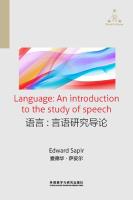书评
用户823552
Language: An Introduction to the Study of Speech stands as a seminal work within the American ideationalist school of linguistics, offering a comprehensive and systematic exploration of the multifaceted nature of language. This influential text delves into a wide array of topics, ranging from the fundamental objects of linguistics and language components to intricate discussions on phonetics, grammatical processes, structural types of languages, language development, phonetic laws, and the complex interplay between language, race, culture, and literature.
One of the most remarkable aspects of this book is its
unique theoretical framework, which is largely constructed upon the
philosophical foundation of The Philosophy of Mind by Benedetto
Croce, an Italian idealist philosopher affiliated with the
Neo-Hegelian school. This philosophical underpinning imbues the
linguistic analyses with a distinctive perspective, blurring the
boundaries between language study and philosophical inquiry. By
integrating Croce’s idealist concepts, the author approaches language
not merely as a mechanical system of signs but as a dynamic
manifestation of human thought and cultural expression.
The book’s strength lies in its broad scope and depth of
analysis. It presents a detailed grammar-typological classification of
languages, drawing insightful comparisons between diverse linguistic
systems such as Chinese and Nootka. These cross-linguistic
examinations not only highlight the structural diversity of human
languages but also offer valuable insights into the cognitive and
cultural factors that shape language construction. For example, the
contrasting syntactic structures and semantic principles of Chinese
and Nootka languages are dissected to illustrate how different
cultures perceive and categorize the world through language.
Moreover, the author’s speculations on language drift and
the arbitrariness of the associations between language, race, and
culture are particularly thought-provoking. By challenging
conventional assumptions, the book encourages readers to reevaluate
the simplistic links often drawn between these complex phenomena. It
posits that language evolution is influenced by a multitude of social,
historical, and cultural factors, rather than being solely determined
by genetic or racial elements. This perspective has been instrumental
in shaping subsequent research in sociolinguistics and anthropological
linguistics, inspiring scholars to explore the intricate web of
relationships between language and human society.
However, the book’s heavy reliance on idealist philosophy
may pose a challenge for some readers. The abstract nature of Croce’s
ideas, when applied to linguistic analysis, can make certain sections
dense and difficult to follow, especially for those unfamiliar with
philosophical discourse. Additionally, given the book’s publication in
a specific historical context, some of its theories and
classifications may have been updated or refined by more recent
linguistic research.
Despite these limitations, Language: An Introduction to
the Study of Speech remains an indispensable resource for
linguists, anthropologists, and anyone interested in the profound
relationship between language and human experience. Its innovative
approach, comprehensive coverage, and thought-provoking arguments have
left an indelible mark on the field of linguistics, continuing to
inspire generations of scholars to explore the fascinating world of
language from new and diverse perspectives.



 京公网安备 11010802032529号
京公网安备 11010802032529号